Insecurities are those feelings that we have that are diminishing and oppressive to our very way of being and experiencing the world around us, including the relationships we have with others.
When we have those insecure feelings, we are not necessarily thinking or behaving in healthy ways that are supportive of our overall positive experience of ourselves, of life and of others.
Understanding this may impart a little guilt as you realise that you have been creating limits in your life and your relationships. These limitations may well have begun as a protective method, often stemming from childhood experiences, however, if they remain unchecked, unchallenged and unreflected upon, what once began as a form of keeping one safe grew into something a little more insidious in nature.
On the more technical side, insecurities are negative thoughts and feelings about oneself that can lead to anxiety, low self-esteem, and self-doubt. Insecurity is a feeling of inadequacy or uncertainty about oneself. They can be about anything, including appearance, intelligence, relationships, or abilities.
There are various factors that contribute to and cause insecurities, and these include various factors, including childhood experiences, negative feedback from others, and unrealistic expectations.
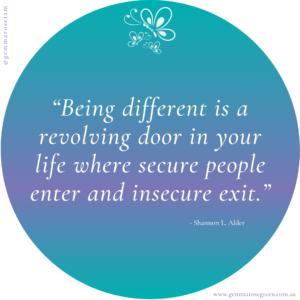
Insecurity is a feeling of inadequacy or uncertainty about oneself, some examples of which are:
- Feeling like you’re not good enough
- Worrying about what others think of you
- Comparing yourself to others
- Feeling like you’re not smart enough
- Feeling like you’re not attractive enough
- Feeling like you’re not successful enough
Insecurities can have a negative impact on your life in a number of ways. They can make it difficult to form relationships, take risks, and achieve your goals. They can also lead to anxiety, depression, and other mental health problems.
Insecurities are a normal part of life, but they don’t have to control you. If you’re struggling with insecurities, there are things you can do to overcome them. By following the tips outlined today, you can learn to manage your insecurities and live a more confident life.
- Acknowledge Your Insecurities
It’s essential to recognize that you have insecurities if you want to overcome them. Feeling insecure is normal and happens to everyone. However, it’s crucial not to let your insecurities take over your life.
- Challenge Your Negative Thought.
Insecurities are enlivened with negative thoughts. When you have insecure thoughts, question the validity of those thoughts by asking yourself if it’s really true. Is there any evidence to back or support the thoughts? More often than not, our insecurities are based on false beliefs about ourselves.
- Focus On Your Strengths.
Each person has their own set of strengths and weaknesses. Instead of getting stuck on your weaknesses, try to focus on your strengths. What activities do you excel at? What brings you joy? By focusing on and emphasizing your strengths, you’ll be able to boost your self-assurance and confidence.
- Set Realistic Goals.
It’s important to avoid setting unrealistic goals and setting yourself up for failure. Begin with small, achievable goals and gradually increase the difficulty level as you progress. This approach will help you build confidence with each goal you achieve..
- Surround Yourself With Positive People.
The people you spend time with can have a large impact on your self-esteem. Surround yourself with positive people who make you feel good about yourself. Avoid people who are negative or critical.
- Practice Self-Care.
Taking care of yourself physically and emotionally is important for your overall well-being. Make sure you’re getting enough sleep, eating healthy foods, and exercising regularly. You should also make time for activities that you enjoy. When you take care of yourself, you’ll feel better about yourself overall.
- Seek Professional Help If Needed.
If you’re struggling to overcome your insecurities on your own, don’t hesitate to seek professional help. A therapist can help you understand your insecurities and develop strategies for overcoming them.
Overcoming insecurities takes time and effort, but it is possible. By following these tips, you can learn to love and accept yourself for who you are.
Some additional tips to help you with this are:
- Talk to someone you trust. Talking about your insecurities can help you feel less alone and ashamed.
- Don’t compare yourself to others. Everyone is different and has their own unique strengths and weaknesses.
- Be kind to yourself. Treat yourself with the same compassion and understanding that you would treat a friend.
- Remember that you are worthy of love and respect. You are a valuable and unique individual.
Insecurity, Attachments & Relationships
There are both secure and insecure forms of attachment, with the latter being the contributor to dysfunctional experiences in relationships.
Insecure attachment is a type of attachment style that is characterized by anxiety, fear, and mistrust. It affects our relational capabilities and the quality of our relationships. People with insecure attachment styles may have difficulty trusting others, may be overly dependent on others, or may have difficulty forming close relationships.
In the context of attachment styles, there are three main types of insecure attachment:
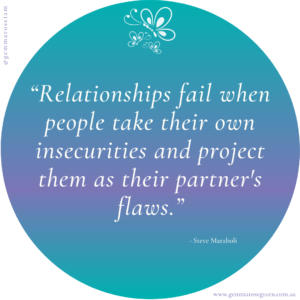
- Anxious Attachment: People with anxious attachment styles may worry about being abandoned or rejected by their partners. They may constantly seek reassurance from their partners and may have difficulty feeling secure in their relationships.
- Avoidant Attachment: People with avoidant attachment styles may push others away or avoid close relationships altogether. They may be uncomfortable with intimacy and may be afraid of being hurt.
- Disorganized Attachment: People with disorganized attachment styles may have difficulty regulating their emotions and may have difficulty trusting others. They may experience sudden changes in mood and may have difficulty forming stable relationships.
As with insecurities, insecure attachment styles can be caused by various factors, including childhood experiences, negative feedback from others, and unrealistic expectations.
Insecurities can show up in relationships in a number of ways. Here are a few examples:
- Jealousy: People with insecurities may be more likely to feel jealous of their partners. They may worry that their partners are attracted to other people or that they are going to leave them.
- Controlling behaviour: People with insecurities may try to control their partners in order to feel more secure. They may try to dictate who their partners can spend time with, what they can wear, or what they can do.
- Neediness: People with insecurities may be more needy in their relationships. They may constantly seek reassurance from their partners and may have difficulty feeling secure without them.
- Criticism: People with insecurities may be more critical of their partners. They may find fault with everything their partners do and say, which can make it difficult for their partners to feel good about themselves.
- Avoidance: People with insecurities may avoid their partners or intimacy altogether. They may be afraid of being hurt or rejected, so they choose to stay away from their partners.
Managing insecure attachment styles can benefit from the tips previously mentioned, leading to improved relationships and your overall well-being. However, there is one point of difference relative to the first step of acknowledgement. It is the acknowledgement of the insecure attachment style that will begin the process of healing and change.
Therefore the process to managing and improving your insecure attachment style looks like this:
- Acknowledge that you have an insecure attachment style.
- Challenge your negative thoughts.
- Focus on your strengths.
- Set realistic goals.
- Surround yourself with positive people.
- Practice self-care.
- Seeking professional help.
On a relational level, you can improve your relationships with the following tips:
- Talk To Your Partner
It can be helpful to talk to your partner about your insecurities and how they are affecting your relationship. They may be able to offer support and understanding, and they may be able to help you work through your insecurities.
- Seek Professional Help
If you are struggling to overcome your insecurities on your own, you may want to seek professional help. A therapist can help you understand your insecurities and develop strategies for overcoming them.
- Focus On The Positive Aspects Of Your Relationship.
It is important to focus on the positive aspects of your relationship, even when you are feeling insecure. Remind yourself of all the reasons you love your partner and why you are in a relationship with them.
- Practice Self-care
Taking care of yourself physically, emotionally and mentally is important for your overall well-being. Along with ensuring you are getting enough sleep, eating healthy foods, and exercising regularly, you should also be taking reflective and restorative time for yourself.
Insecurities and insecure attachments are normal. Everyone experiences insecurities in some way, shape or form, and they can be managed and improved with consistent and conscious effort.
To summarise what we have explored today, insecurities are feelings of inadequacy or uncertainty about oneself. They can be about anything, including appearance, intelligence, relationships, or abilities. Insecurities can be caused by various factors, including childhood experiences and negative feedback, and they can have a negative impact on your life in a number of ways, including relationship difficulties, risk-taking, and goal achievement. Insecurities can also lead to anxiety, depression, and other mental health problems.
If you’re struggling with insecurities, there are things you can do to overcome them, such as acknowledging your insecurities, challenging your negative thoughts, focusing on your strengths, setting realistic goals, surrounding yourself with positive people, practising self-care and seeking professional help if needed.
I hope you found this information on insecurities and insecure attachments helpful, and don’t forget, professional help is available to you and you need only to reach out and ask for it.
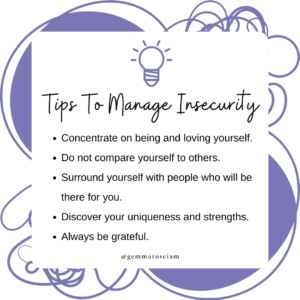
Ways I Can Help:
My intuitive counselling sessions can help you identify, explore, process and overcome insecurities, including insecure attachments. Bookings are open, available in a virtual setting or in-person, and accessible here: Book Counselling Session
Alternatively, book a free consultation to evaluate our capacity to work together on your healing journey: Book Clarity Call
Best Wishes,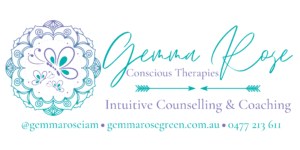
P.S. Join the Conscious By Design FB for more conversations on insecurities and insecure attachments.

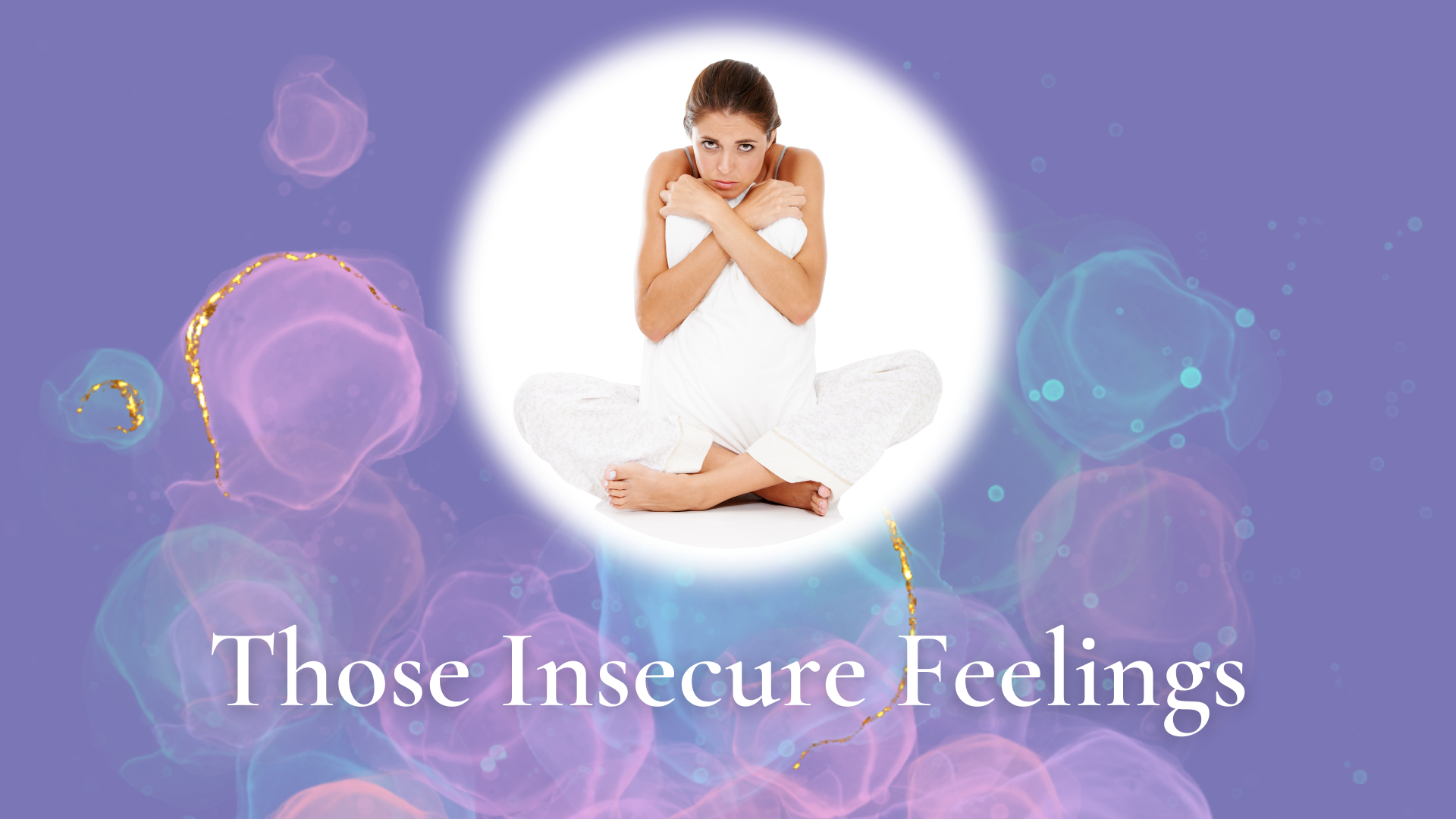
0 Comments